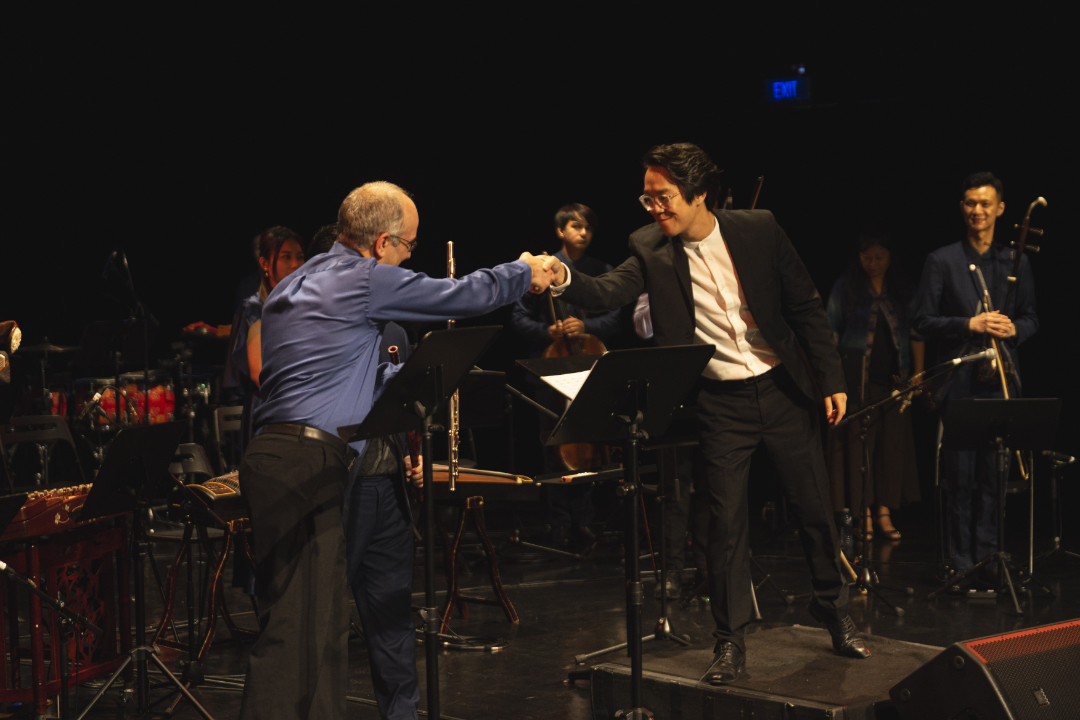pdf – review_ Ding Yi SOD _ Singapore Straits Times 2024
THE STRAITS TIMES (Singapore)
Concert review: Ding Yi and Canada’s Sound Of Dragon play in synergistic cultural exchange

Flautist Paolo Bortolussi (left) from Sound Of Dragon Ensemble and Ding Yi’s Dedric Wong at the Rising Dragon, Soaring Merlion concert. PHOTO: AMOS POH
Chang Tou Liang
————————————————————————————————————–
Rising Dragon, Soaring Merlion
Ding Yi Music Company Stamford Arts Centre Black Box Jan 6, 7.30 pm
Ding Yi Music Company regularly works with overseas chamber ensembles in cultural exchanges, and the results are often greater than the sum of its parts.
Its first event of the year, in collaboration with Vancouver’s Sound Of Dragon Ensemble, was a prime example of this synergy.
The 90-minute concert without intermission opened with five members of Ding Yi playing Wang Jian Ming’s Dream Of Angels, a soulful work of meditative quiet. Ng Hsien Han’s dizi was the protagonist, with the hall dimmed to semi-darkness to evoke mood music which briefly gathered pace before receding into silence.
Then it was the turn of six players from Sound Of Dragon with its artistic director Lan Tung’s From The Stars. This 2017 multimedia work, conceived with Canada’s First Nations members, dwelled on the evolution of celestial bodies.
Led by Taiwanese conductor Chih Sheng Chen, this fusion work saw Tung playing erhu and vocalising melismata harking back to hauntingly evocative songs of indigenous peoples. There was also a jazzy element provided by the marimba beats of percussionist Chris Blaber.
The first work to combine both ensembles was Young Artist Award recipient Wang Chenwei’s Winds Of Affinity, conducted by Ding Yi’s resident conductor Dedric Wong De Li.
This double flute concerto paired Paolo Bortolussi’s flute with Ng’s dizis, contrasting Western mellowness with eastern plangency to dazzling effect. For good measure, the movement also included an Oriental-flavoured fugue to spice things up.
The mood of the concert then took a serious turn with Chinese composer Li Chenyao’s The Allegory (Ting Gu), which recalled the art of itinerant streetside story-tellers.
It must have been a suspenseful tale retold in this 2015 prize-winning work, with percussion crashes and screeching dissonances dictating the music’s mood and narrative, the only respite being its unresolved ending.
More doleful was Canadian rabbinical composer Moshe Denburg’s The Ocean Of Tears, written in 2020 during the height of the Covid-19 pandemic.
Cast entirely in the minor key, the music expressed the universality of grief in its multifarious influences. Slavic, Hebraic, Arabic and Japanese elements could all be sensed, and given the present sorry states of war and natural disaster in 2024, this elegaic work resonated deeply but did offer a glimmer of hope at its close.
The concert’s final work was Canadian composer Alice Ping Yee Ho’s Four Dragons (Si Tian Long), a celebration of Chinese mythology with the four celestial beings turned into China’s four great rivers.
Modern in idiom, its apparent violence juxtaposed with a certain whimsicality saw the voices of Tung and throat singer Bruce Qinglin Bai thrown into the mix for a raucous conclusion.
Conductor Chen coaxed enough applause from the somewhat reticent audience for an encore to be performed. Tung’s eponymous Sound Of Dragon, the visiting ensemble’s motto piece, was a lively improvisation over an ostinato bass, a propitious greeting for the lunar new year to come.
